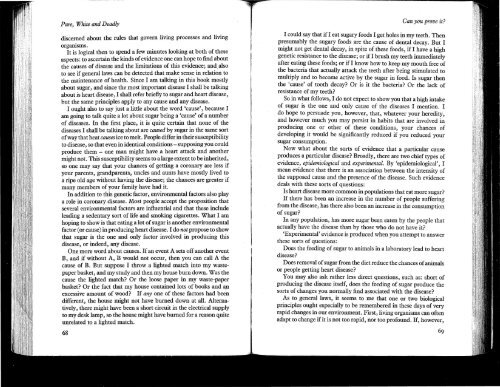John_Yudkin_-_Pure_White_and_Deadly_revised_1986_OCR
John_Yudkin_-_Pure_White_and_Deadly_revised_1986_OCR
John_Yudkin_-_Pure_White_and_Deadly_revised_1986_OCR
You also want an ePaper? Increase the reach of your titles
YUMPU automatically turns print PDFs into web optimized ePapers that Google loves.
<strong>Pure</strong>, <strong>White</strong> <strong>and</strong> <strong>Deadly</strong><br />
discerned about the rules that govern living processes <strong>and</strong> living<br />
organisms.<br />
It is logical then to spend a few minutes looking at both of these<br />
aspects: to ascertain the kinds of evidence one can hope to find about<br />
the causes of disease <strong>and</strong> the limitations of this evidence; <strong>and</strong> also<br />
to see if general laws can be detected that make sense in relation to<br />
the maintenance of health. Since I am talking in this book mostly<br />
about sugar, <strong>and</strong> since the most important disease I shall be talking<br />
about is heart disease, I shall refer briefly to sugar <strong>and</strong> heart disease,<br />
but the same principles apply to any cause <strong>and</strong> any disease.<br />
I ought also to say just a little about the word 'cause', because I<br />
am going to talk quite a lot about sugar being a 'cause' of a number<br />
of diseases. In the first place, it is quite certain that none of the<br />
diseases I shall be talking about are caused by sugar in the same sort<br />
of way that heat causes ice to melt. People differ in their susceptibility<br />
to disease, so that even in identical conditions - supposing you could<br />
produce them - one man might have a heart attack <strong>and</strong> another<br />
might not. This susceptibility seems to a large extent to be inherited,<br />
so one may say that your chances of getting a coronary are less if<br />
your parents, gr<strong>and</strong>parents, uncles <strong>and</strong> aunts have mostly lived to<br />
a ripe old age without having the disease; the chances are greater if<br />
many members of your family have had it.<br />
In addition to this genetic factor, environmental factors also play<br />
a role in coronary disease. Most people accept the proposition that<br />
several environmental factors are influential <strong>and</strong> that these include<br />
leading a sedentary sort of life <strong>and</strong> smoking cigarettes. What I am<br />
hoping to show is that eating a lot of sugar is another environmental<br />
factor (or cause) in producing heart disease. I do not propose to show<br />
that sugar is the one <strong>and</strong> only factor involved in producing this<br />
disease, or indeed, any disease.<br />
One more word about causes. If an event A sets off another event<br />
B, <strong>and</strong> if without A, B would not occur, then you can call A the<br />
cause of B. But suppose I throw a lighted match into my wastepaper<br />
basket, <strong>and</strong> my study <strong>and</strong> then my house burn down. Was the<br />
cause the lighted match? Or the loose paper in my waste-paper<br />
basket? Or the fact that my house contained lots of books <strong>and</strong> an<br />
excessive amount of wood? If anyone of these factors had been<br />
different, the house might not have burned down at all. Alternatively,<br />
there might have been a short circuit in the electrical supply<br />
to my desk lamp, so the house might have burned for a reason quite<br />
unrelated to a lighted match.<br />
68<br />
Can you prove it?<br />
I could say that if I eat sugary foods I get holes in my teeth. Then<br />
pr~sumably the sugary foods are the cause of dental decay. But I<br />
mlgh~ not ?"et dental decay, in spite of these foods, if I have a high<br />
genetlc ~eslstance to the dis~ase; or if I brush my teeth immediately<br />
after eatlng these foods; or If I know how to keep my mouth free of<br />
the ~acteria that actually attack the teeth after being stimulated to<br />
multiply <strong>and</strong> to become active by the sugar in food. Is sugar then<br />
the 'cause' of tooth decay? Or is it the bacteria? Or the lack of<br />
resistance of my teeth?<br />
So in w~at follows, I do not expect to show you that a high intake<br />
of sugar IS the one <strong>and</strong> only cause of the diseases I mention. I<br />
do hope to persuade you, however, that, whatever your heredity,<br />
<strong>and</strong> however much you may persist in habits that are involved in<br />
producing one or other of these conditions, your chances of<br />
developing it w?uld be significantly reduced if you reduced your<br />
sugar consumptIon.<br />
Now what about the sorts of evidence that a particular cause<br />
produces a particular disease? Broadly, there are two chief types of<br />
evidence: epidemiological <strong>and</strong> experimental. By 'epidemiological', I<br />
mean eVidence that there is an association between the intensity of<br />
the supposed cause <strong>and</strong> the presence of the disease. Such evidence<br />
deals with these sorts of questions:<br />
Is heart disease more common in popUlations that eat more sugar?<br />
If there .has been an increase in the number of people suffering<br />
from the dIsease, has there also been an increase in the consumption<br />
of sugar?<br />
In any popUlation, has more sugar been eaten by the people that<br />
actually have the disease than by those who do not have it?<br />
'Experimental' evidence is produced when you attempt to answer<br />
these sorts of questions:<br />
Does the feeding of sugar to animals in a laboratory lead to heart<br />
disease?<br />
Does removal of sugar from the diet reduce the chances of animals<br />
or people getting heart disease?<br />
You may also ask rather less direct questions, such as: short of<br />
producing the disease itself, does the feeding of sugar produce the<br />
sorts of changes you normally find associated with the disease?<br />
~s . to general laws,. it seems to me that one or two biological<br />
pn~clples oug~t especla~ly to be remembered in these days of very<br />
rapId changes In our enVIronment. First, living organisms can often<br />
adapt to change if it is not too rapid, nor too profound. If, however,



